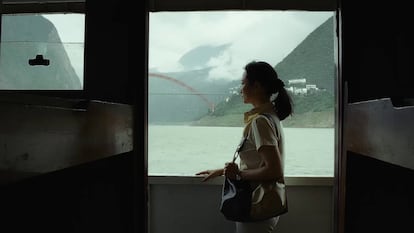“Not even a fire can with all the grass. The spring breeze will make it grow again.” The proverb that touches the three segments of At driftthe last work of Chinese director Jia Zhangke, it is not just a lyrical appointment: it is a political summary, a declaration of film principles and a form of comfort. Because in his cinema nothing disappears at all, not even what the waters have buried.
In which it was his seventh presence in the competition section of the Cannes Festival (in the 2024 edition), the renowned reputed recides with an already known but never exhausted structure: that of intimate history as choral resonance. Three historical moments, three geographies (Datong, Fengjie, Zhanhai) and the same sensation: that of a country that has entered the 21st century with a mixture of vertigo, reconstruction, corruption and moral defeat. And it does it through a minimum story, a rintimental relationship barely outlined, but drawn with the depth that only stylists are able to infuse the mild.
The film, filmed over 20 years with the interpreters themselves, with a small part of their images belonging to previous works, and narratively formed in the assembly phase, is divided into three plots. The first, set in Datong, in northern China, in 2001, in times of the mandate as a supreme leader of Jiang Zemin, and around the country’s entrance to the World Trade Organization and the election of Beijing as the headquarters of the Olympic Games. The second, in Fengjie, in 2006, a few kilometers from the Dam of the Three Cups, the largest hydroelectric plant, which buried 19 cities already more than 300 villages under its waters. And the third, in Zhanhai, in 2022, with the Qatar World Cup in the background and, much more important, a postcovid of masks and devastation. At drift He articulates an emotional cartography in parallel to geopolitics, while his characters – sometimes silhouettes, often ghosts of themselves – seek an anchor, a way of being in a land where the ground always seems to move.
As was the case in Ash is the purest white and in Still lifehere the landscape is again a diagnosis: a living, eroded, devastated body, but of a strange beauty. The mines, the contaminated rivers, the decadent clubs, the sad karaokes and the lots eaten by the waiting moss speak as much or more than the few dialogues. Jia knows it and that is why he films and narrates without a hurry, with textures that mutate from the digital video to the pretending celluloid, formats that expand and contract as if the screen itself breathes to the rhythm of its protagonists.
And if in his previous films the filmmaker served as ellipsis as a narrative purification weapon, here he brushes abstraction. There are times when the line between fiction and documentary is blurred. And sequences in which music – extracted by popular karaokes or electronic parties – becomes confession, emotional manifesto. In fact, the chorus of one of the songs, that “drifting”, exercises title and summarizes its double condition: affective chronicle and political treaty.
It is not a kind job. Like almost all its filmography from Platform, unknown pleasures y The world (Titles that some Spanish cinephiles began to discover, at the beginning of this century, through the old cinematk channel, because they had not even reached the rooms), At drift It demands a strong commitment of the spectator. Patience, courage and interest. If you enter your tempo and your world, the reward is immense. If not, the movie can become a slab, a wandering without an anchor. At drift It is a desolate and beautiful reflection on what is left when everything changes. Because, as the proverb says, despite the fire – or precisely for him – something will sprout again. Even in the middle of the mud.
At drift
Address: Jia Zhangke.
Interpreters: Zhao Tao, Li Zhubin, Jianlin Pan, Lan Zhou.
Gender: drama. China, 2024.
Duración: 111 minutes.
Premiere: June 27.

